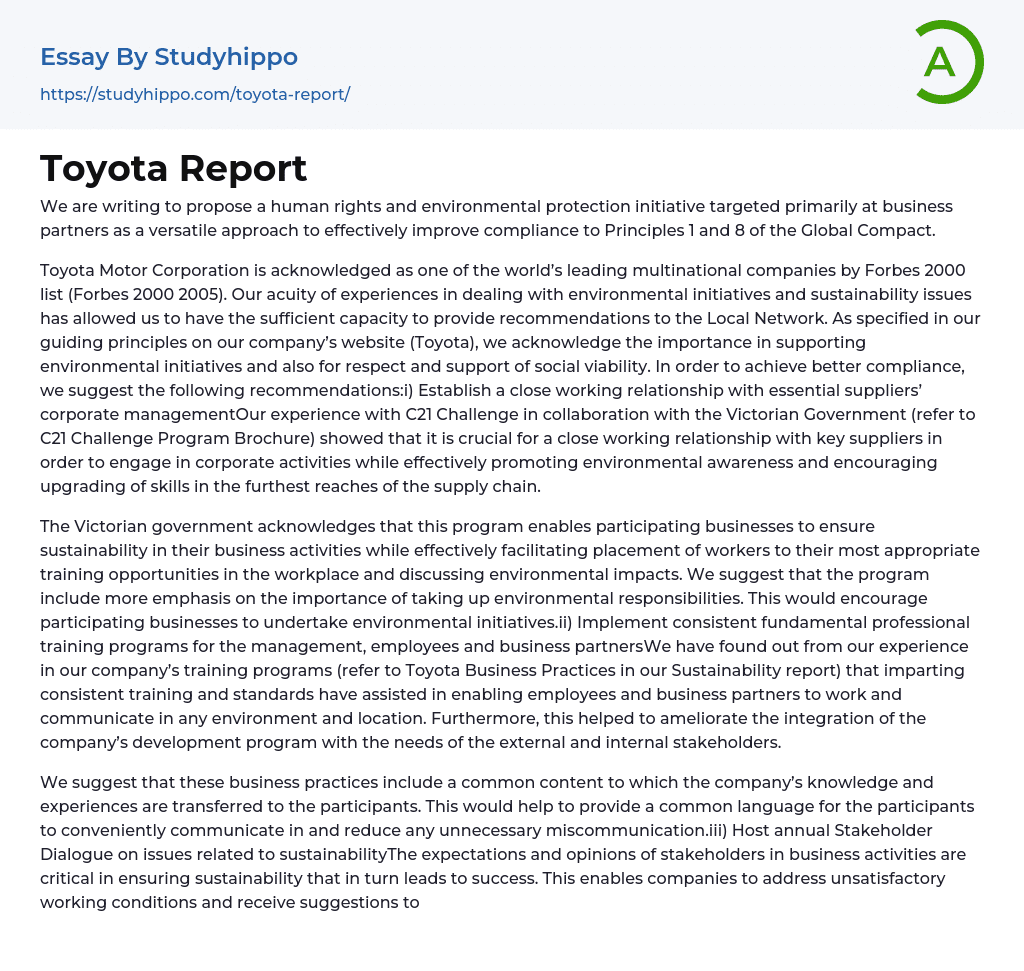We propose a versatile approach to improve compliance to Principles 1 and 8 of the Global Compact. The initiative aims to address human rights and environmental protection, with business partners as the primary target.
According to the Forbes 2000 list (Forbes 2000 2005), Toyota Motor Corporation is recognized globally as one of the leading multinational companies. With our vast knowledge and involvement in environmental initiatives and sustainability issues, we possess the necessary capability to provide recommendations to the Local Network. Our guiding principles, as stated on our company's website (Toyota), highlight the significance of backing environmental initiatives and supporting social responsibility. To enhance compliance, we recommend the following: i) Develop a strong relationship with the management of essential suppliers. Our partnership with the Victorian Government in the C21 Challenge (refer to C21 Challenge Program Brochure) exemplified the vital importance of closely collaborating with key suppliers in order to engage in
...corporate activities that promote environmental awareness and skill advancement throughout the supply chain.
The Victorian government recognizes the program's benefits, which assist businesses in promoting sustainable practices and providing employees with appropriate training opportunities in the workplace that address environmental impacts. To encourage participating businesses to undertake environmental initiatives, we recommend emphasizing the importance of environmental responsibility within the program. Additionally, based on our company's experience, we suggest implementing consistent training programs for management, employees, and business partners. This approach promotes the ability to work and communicate effectively in any environment while integrating external and internal stakeholders' needs.
We recommend incorporating a shared content that encompasses the organization's knowledge and experiences to enhance communication and reduce misinterpretation. Additionally, it is crucial to conduct an annual Stakeholder Dialogue on
sustainability-related topics. This helps businesses receive valuable input from stakeholders, which can lead to improved working conditions and enhanced environmental responsibility. The Toyota Stakeholder Dialogues in our Sustainability report serve as an example of how such discussions can promote a better understanding of Corporate Social Responsibility (CSR) activities and pave the way for future initiatives.
According to Ford (2010), learning from other companies’ experiences has revealed that it is important to provide assistance to suppliers in managing working conditions and not just measuring compliance with the company’s regulations. The dialogue with Tier 1 suppliers is crucial, as they are expected to enforce the same standards on their own suppliers. The involvement of supply chains in this interconnected network will lead to a more effective and motivated approach toward improved compliance with Principles 1 and 8 of the Global Compact. Joining Local Network members provides intangible benefits, including the ability to influence their own supply chain and increased mutual understanding among participating businesses. Cooperation between business partners in protecting human rights, such as fair remuneration and environmental sustainability projects, is encouraged. This vast network generates a larger impact on stakeholders, motivating them to adopt such practices collectively rather than individually.
Network members can function as a means of reaching out to garner additional support beyond their own network for projects, ultimately facilitating project funding and increasing the likelihood of success. Nevertheless, there are inevitable obstacles and trade-offs associated with the adoption of this initiative aimed at safeguarding the environment and human rights. The primary obstacle that may arise is a business partner who is reluctant to participate and collaborate in the undertaking. Additionally, a lack of
transparency between business partners and other stakeholders may hinder cooperation and comprehension, thereby limiting the effectiveness of projects. In this instance, stakeholder dialogue and training programs can enhance lucidity in corporate activities and standards.
Based on our experience working with business partners and stakeholders, we have found that achieving compliance with Principles 1 and 8 of the Global Compact supports our Guiding Principles of fostering a corporate culture that respects both management and labour, as well as the environmental principles set forth in the Earth Charter. Implementing these recommendations will aid Local Network members in improving their compliance with these two principles of the Global Compact.
- Accounting essays
- Andrew Carnegie essays
- Automation essays
- Business Cycle essays
- Business Intelligence essays
- Business Model essays
- Business Operations essays
- Business Software essays
- Cooperation essays
- Cooperative essays
- Corporate Social Responsibility essays
- Corporation essays
- Customer Relationship Management essays
- Family Business essays
- Franchising essays
- Harvard Business School essays
- Harvard university essays
- Human Resource Management essays
- Infrastructure essays
- Inventory essays
- Logistics essays
- Management essays
- Manufacturing essays
- Market essays
- Marketing essays
- Multinational Corporation essays
- News Media essays
- Online Shopping essays
- Quality Assurance essays
- Richard Branson essays
- Sales essays
- Selling essays
- Shopping Mall essays
- Small Business essays
- Starting a Business essays
- Stock essays
- Strategy essays
- Structure essays
- Trade Union essays
- Waste essays
- Activism essays
- Communism essays
- Conservatism essays
- Liberalism essays
- Marxism essays
- Nationalism essays
- Patriotism essays
- Policy essays
- Public Policy essays
- Social Contract essays




